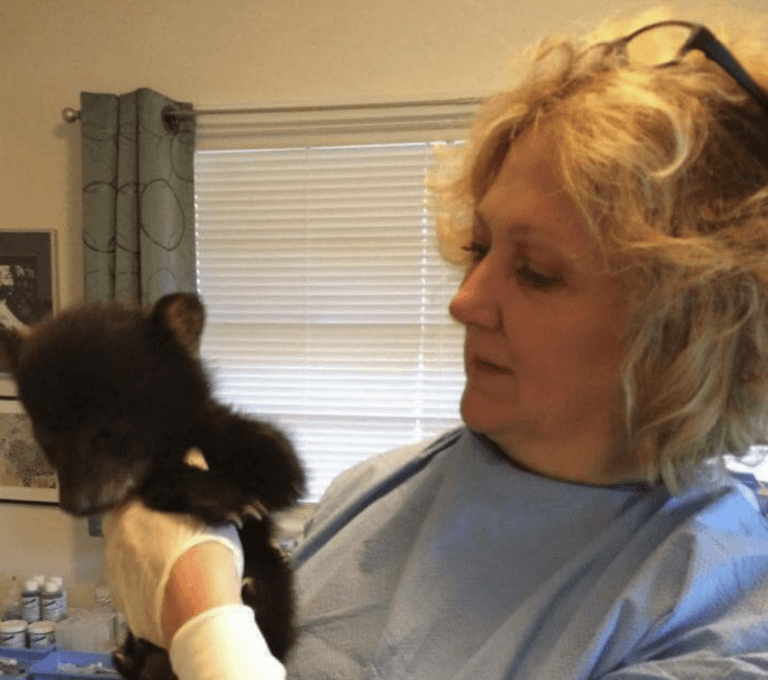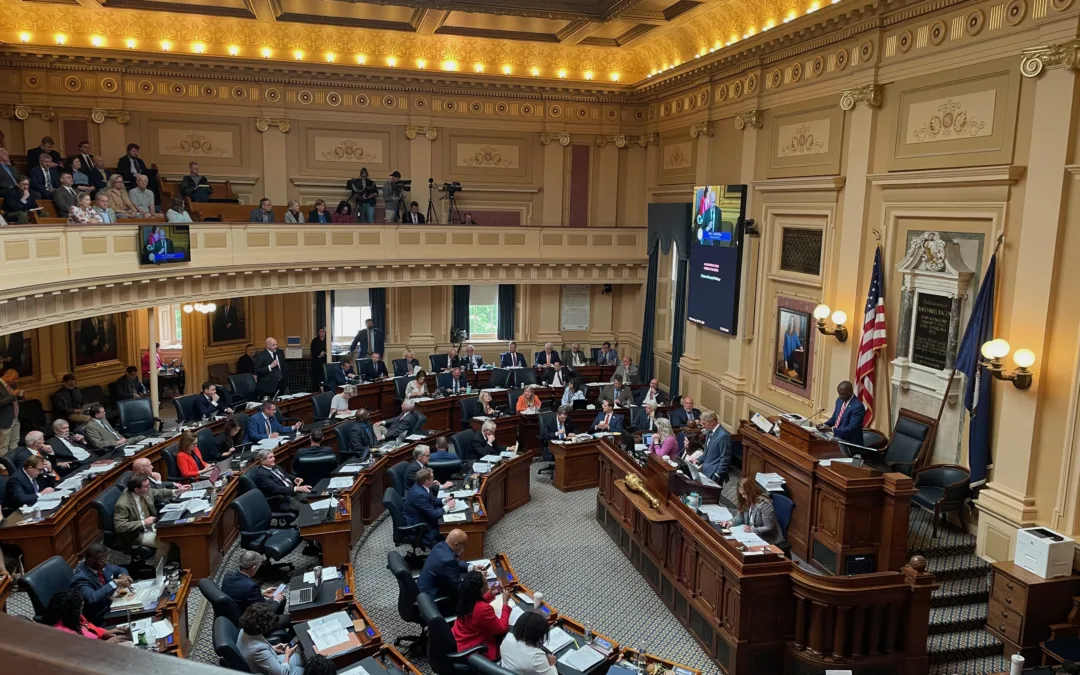
Sabrina Garvin, executive director of the Southwest Virginia Wildlife Center of Roanoke, rehabilitates a bear cub.
It’s been a wild year at the Southwest Virginia Wildlife Center of Roanoke.
ROANOKE – Sabrina Garvin had a wild 2020 – and it wasn’t just due to the COVID-19 pandemic. She’s the executive director and co-founder of the Southwest Virginia Wildlife Center of Roanoke, which welcomed more animals than usual during the pandemic.
“This year was quite busy because of COVID,” Garvin said. “People were home. They were in their yard. They were finding things and they had their dog with them. And so digging up rabbit nests was really big this year, when people were out working in their yards.”
The influx of animals didn’t stop the animal rescue and rehabilitation team from doing their best to help every client possible.
“That’s what we’re here for,” Garvin said. “We want to put animals back out in the wild – healthy animals that are viable, and they’re going to get out and reproduce and help our environment.”
Animal education
However, the center didn’t take in every single animal folks called about. That’s because not every case was an emergency, even if it appeared so on the surface.
In addition to their rehabilitation efforts, the center also focuses on educating the public about the difference between true animal emergencies and normal animal tendencies.
“We try to stop an animal that doesn’t need to come in,” Garvin said. “Many people think, ‘Oh, it needs to be rescued. It’s hopping around on the ground alone.’ We ask a lot of questions to make sure that this is an animal or a bird that needs to come in.”
Oftentimes, the callers express concern that an animal could be orphaned because there’s no parent in sight.
“As babies get older, mom’s not necessarily right beside them,” Garvin said. “We don’t want to kidnap.”
By quelling a concerned caller’s fears with information about different species’ behaviors, the team at the Southwest Virginia Wildlife Center of Roanoke have opportunities to focus on the furry and feathery clients that need emergency care.
“We really need to spend our time and efforts on the truly injured and orphaned babies,” Garvin said. “Believe me, we have plenty.”
Stepping In
When center staff deems an animal’s circumstance a legitimate concern, they jump into action.
Sometimes, staff members head out to the scene, especially if the rescue involves a bird.
“If it’s an eagle and a game warden might need help, there are certain cases that we can [assist],” Garvin said. “But usually, it’s with a raptor because that’s a little more dangerous.”
Other times, concerned community members, animal control officers or staff members with the Department of Wildlife Resources bring injured or orphaned animals straight to the center.
“We walk folks through how to safely pick up and animal, scoop it up in a box,” Garvin said. “We don’t want children handling the animals, of course.”

The Wildlife Rehab Process
Once an animal arrives at the center, Garvin’s team gets to work. There’s no specific formula for the perfect rehab – each patient demonstrates different needs.
“It starts out early spring, we get small mammals – squirrels, flying squirrels, rabbits and possums – and then goes into birds,” Garvin said. “It depends on the age. If we get a baby that’s a newborn bird, it may take us 30 to 45 days. If we get an animal that’s an adult that has a fracture, that’s going to be easily 45 days, easily, sometimes 60. It just depends on the species.”
For example, a woodpecker takes more time to properly rehabilitate than some other birds because they stay with their parents for longer.
“It just depends,” Garvin said. “We want to get them in and out as soon as possible, but some require a longer stay.”
The time frame an animal remains at the center depends on when it starts eating food and hitting other milestones. Some rehabs move along more quickly than others because other animals take their same species under their wing – literally.
“If we have an older bird, the same species, they actually teach them,” Garvin said. “It’s so much quicker to learn from them because birds imprint. They’ll say, ‘Oh, it’s a bluejay. He’s eating.’ And sometimes an older bird will teach a younger bird, which we love. And that helps us.”
Staff members release animals back into the same area they originated, culminating their rehabilitation process.
“An animal, like an owl, does not really migrate. So releasing him here, he’s going to have to find his way home,” Garvin said. “We believe he’s already got a habitat. He’s got possibly a mate that’s still there. So that’s why it’s important.”
Intervening with Wildlife
Sadly, wild animals become injured and pass away all the time. It’s part of the circle of life. However, letting the natural state of nature run its course ends when human interference begins.
“Unfortunately because of humans, we’ve all created buildings with windows,” Garvin said. “We have roads and cars. We have chemicals and toxins.”
By making the human world more convenient, some animals face hardships. Organizations like the Southwest Virginia Wildlife Center of Roanoke help bridge the gap, serving both worlds in tandem.
“If humans didn’t get involved, we would lose a lot of species. A lot of species are on decline,” Garvin said. “Some have turned because humans have worked hard, just like the bald eagles. They’ve come back because humans had got involved and were proactive in making sure the species did not die off. Now they’re not endangered. They’ve moved down from that.”
Animal rescue heroes don’t have to work at wildlife centers to enact change. There are things that each person can do at home to help keep a wild animal’s natural habitat safe.
“Our main thing is, educate people,” Garvin said. “You can change your backyard. We don’t ask you to change the world, but you can change your backyard, which is a wonderful step and a building block.”
Creating a safe space for wildlife has benefits for humans, as well.
“People don’t realize it’s the cycle of life and how very important birds and mammals – what they do for the ecosystem and what they do for us – actually are,” Garvin said. “They stop the spread of disease, and if we keep encroaching in on their habitats, we’ll find that we’re getting in lots of trouble.”
A nonprofit organization
Like many nonprofit organizations, the Southwest Virginia Wildlife Center of Roanoke relies heavily on donations.
Sadly, the generosity of some donors didn’t reach the center right before Christmas. On Dec. 23, Garvin noticed while driving to the center that several mailboxes, including her own and the wildlife center’s, were open and contained no mail.
She quickly alerted authorities, who jumped on the case.
“They found mail. We don’t know if it’s all because we had two people that we’re still trying to track checks,” Garvin said. “It was recovered behind CVS on Brambleton Avenue, next to Kroger’s. Someone has called and said they saw something. So I do not know where that status is.”
The recovered mail contained outgoing and incoming pieces. Since several neighbors also had their mail stolen, Garvin said she did not think it was a targeted attack toward either herself or the wildlife center.
Garvin tried to call the postal service to learn more about the incident, but was unable to reach a representative.
Given the odd circumstances, Garvin got to work, setting up a post office box for the center. The box is not yet available for use, but should be in the coming weeks.
Until then, the best way to make a donation is through the organization’s website. The Southwest Virginia Wildlife Center of Roanoke also accepts donations at the facility, located at 5985 Coleman Rd in Roanoke.
Monetary donations are not the only need at the center. The staff created an online wish list of commonly used items. There are also charitable options that benefit the center, like selecting the Southwest Virginia Wildlife Center of Roanoke as a shopper’s charity of choice through programs like Amazon Smile and Kroger Community Rewards.
Amie Knowles reports for Dogwood. You can reach her at [email protected]
Politics

Youngkin, Democrats to start over on budget talks
The Republican governor stood with Democratic leaders in the General Assembly on Wednesday in a bid to ease tensions over their budget debate....

VIDEO: Domestic abuse victims speak out against the gun law bills Gov. Glenn Youngkin vetoed
Senate Bill 47 and House Bill 46 aim to close the loophole that allows offenders to transfer their firearms to someone else instead of relinquishing...
Local News

Virginia verses: Celebrating 5 poetic icons for National Poetry Month
There’s no shortage of great writers when it comes to our commonwealth. From the haunting verses of Edgar Allan Poe, who found solace in Richmond's...

Join the fun: Recapping Family Literacy Night’s storybook adventures
When’s the last time you read a book aloud with a loved one? If it’s difficult to answer that question, then maybe it’s time to dust off that TBR...





